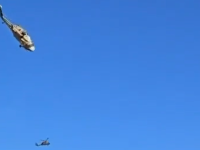Some 180,000 people marched through Tel Aviv’s streets Friday in the city’s 17th annual Gay Pride Parade, the nation’s largest and oldest gay pride event.
The parade, boasting trucks bearing DJs, dancers and drag performers, began at 11 a.m. local time as participants gathered at the city’s Meir Park. At noon, marchers began walking down some of the city’s busiest thoroughfares, ending at Charles Clore Park on the Mediterranean beach.
Welcome to all our guests from abroad to the gay-friendliest city in the world,” Tel Aviv Mayor Ron Huldai declared at the event’s launch Friday morning.
“We’ve been through a lot,” he added. “In 17 years, we’ve achieved a different reality in this city, and also in Israel. I want to tell all the politicians, there is still a great deal of legislation that has to be passed to accept the gay community. We will continue to walk this path, and to support the pride parade.”
The theme of this year’s parade was focused on transgender rights. Events like the parade are key to advancing recognition for the transgendered, Tel Aviv activist Elisha Alexander said earlier this week.
“As the parade approaches, more and more trans people are calling up to get help, to get support, so that’s what visibility does,” stated Alexander. “That’s the main goal of all these pride parades and things like that — it’s just to be visible, that we exist.
“I lived as a straight woman for 30 years,” Alexander added. “Most of the reason it took me so long was just because there was no visibility.”
Security was tight, with police deploying hundreds of officers and warning locals that no cars would be allowed to park along the parade route.
Major arteries in the coastal metropolis were shut at intervals as the march passed through the city, including parts of Tchernichovsky Street, Bograshov, Hayarkon, Frishman, Marmorek, Arlozorov and the Herbert Samuel beachfront promenade.
This year’s celebration featured Eurovision song contest winner and LGBT rights representative Conchita Wurst, who was to perform at Charles Clore Park after the march.









